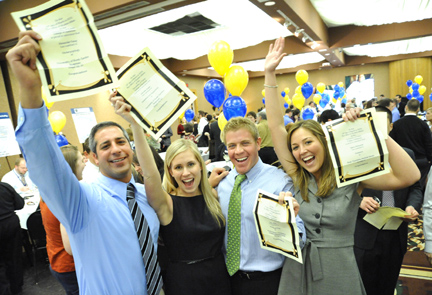At the strike of noon last Thursday at the Pinnacle in Maumee, fourth-year medical students were given envelopes containing information that could very well shape the rest of their lives.

Receiving their first choices in residency matches were graduating medical students, from left, Alexander Farag (University of North Carolina Hospital), Jennifer Gueth (University of North Carolina Hospital), Brian Harr (Northwestern University) and Stacy Hollopeter (Rush University Medical Center in Chicago).
It was Match Day, the annual event at which medical students find out where they will spend the next three to seven years for their medical residencies, therefore affecting their careers and relationships.
Almost immediately upon opening the envelopes, the banquet hall was filled with shrieks and tears of joy. Once again, it was a very successful year for soon-to-be graduates of the UT College of Medicine.
Dr. Jeffrey P. Gold, provost, executive vice president for health affairs and College of medicine dean, said, “I couldn’t be more thrilled with the achievement of this year’s students. The number, type and quality of their matches are truly remarkable and continue to be stronger each year.”
Institutions where students matched include the most competitive academic programs in the country — Harvard, Johns Hopkins and the Mayo Clinic.
Also impressive is the fact that 17 graduates chose to stay at The University of Toledo Medical Center to continue their training.
“We have been working very hard for several years to support the health-care needs of our community, and retaining double the number of our graduates at UTMC last year is a significant accomplishment,” Gold said.
Only four more students will train in other Toledo-area programs, a number the College of Medicine would like to see increase.
A total of 41, or 30 percent, of graduating UT medical students are entering primary-care fields, while 92, or 68 percent, are entering other specialties. Primary care includes family medicine, internal medicine and pediatrics.
After four years at UT, the medical students will disperse to 24 states outside Ohio. In all, 39 percent of students will remain in Ohio. The most popular destinations outside of the Buckeye state are Michigan, Illinois and Pennsylvania.